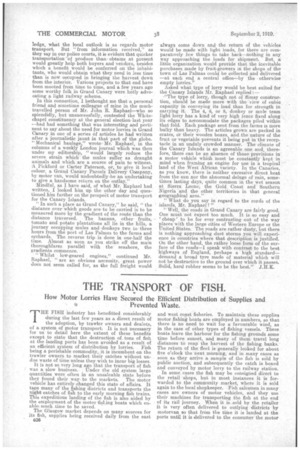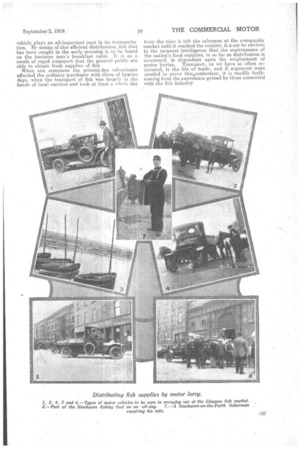THE TRANSPORT OF FISH.
Page 14

Page 15

If you've noticed an error in this article please click here to report it so we can fix it.
How Motor Lorries Have Secured the Efficient Distribution of Supplies and • Prevented Waste.
THE FISH industry has •benefitted considerably during the last fewyears as a direct result of the adoption, by trawler owners and dealer,s, of a system of motor transport: It is not necessary for us to detail here the extent of these benefits except to state that the destruction of tons of fish at the landing ports has been avoided as a result of an efficient system of distribution by lorries. Fish being a perishable commodity,. it is incumbent on the trawler owners to market their catches without undue waste of time unless they wish to incur big losses. It is not so very long ago that the transport of fish was a slow business. Under the old system large quantities were often in an unsaleable state before they found their wayto the markets. The motor vehicle has entirely-changed this state of affairs. It taps many of the fishing districts and transports the night catches of fiat to the early morning fish trains. This expeditious landing of the fish is also aided by the employment of the motor -fishing boats which en able much time to be saved. ' .
The Glasgow market depends on many sources for its fish, supplies being received daily from the east 030
and west coast fisheries. To maintain these supplies motor fishing boats are employed in numbers, so that there is no need to wait for a favourable wind, as in the case of other types of fishing vessels. These boats leave the harbour for the fishing grounds some time before sunset, and many •of them travel long distances to reap the harvest of the fishing banks. The return of the fleet is generally looked for about five o'clock the next morning, and in many cases as soon as• they arrive a sample of the fish is sold by public auction, and subsequently the catch is boxed and conveyed by motor lorry to the railway station.
In some cases the fish may be consigned direct to the retail shops, but in most instances it is forwarded to the community market, where it is sold again to the local shopkeeper. Fish salesmen in many cases are owners of motor vehicles, and they use their machines for transporting the fish at the end of its rail journey. When it is sold by the retailer it is very often delivered to outlying districts by motorvan so that from the time it is landed at the ports until it is delivered to the consumer the motor
vehicle plays an all-important part in its transportation. By means of this efficient distribution, fish that has been caught in the early morning is to be found on the business man's breakfast table. It is as a result of rapid transport that the general public are able to obtain fresh supplies of fish. When one compares the present-day advantages afforded the ordinary purchaser with those of bygone days, when the transport of fish was largely in the hands of local carriers and took at least a whole day
from the time it left the salesman at the community market until it reached the retailer, it must be obvious to the meanest intelligence 'that the maintenance of the nation's food supplies, in so far as distribution is concerned, is dependent upon the employment of motor lorries. Transport, as we have so often reiterated, is the life of trade, and if argument -were needed to prove thisvcontention, it is readily forthcoming from the experience gained by those connected with the fish industry.






















